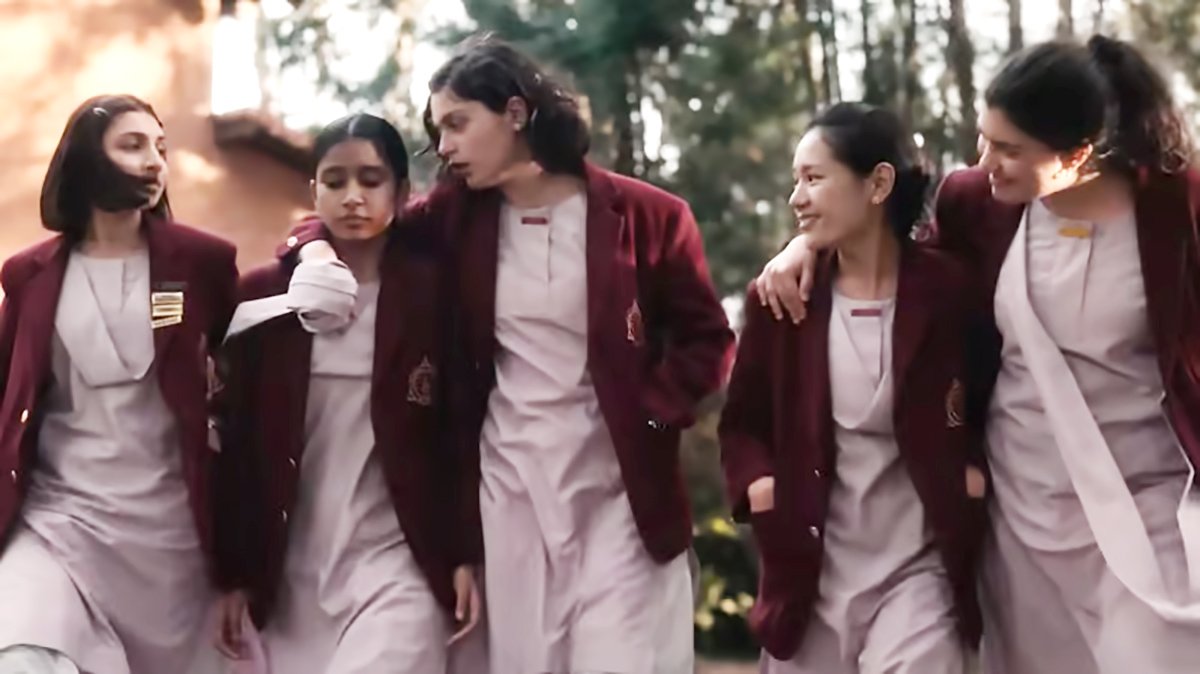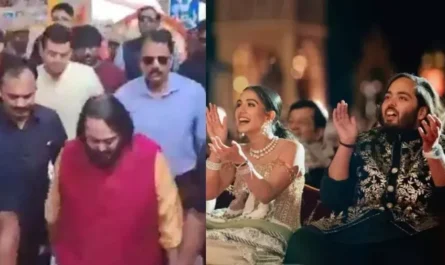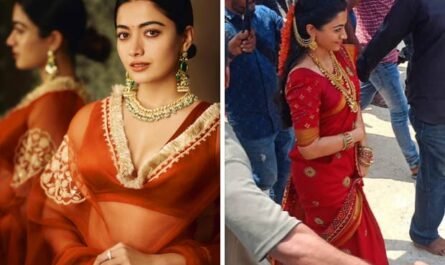” ;}
}
if(document.getElementById(‘subwait_top’)){document.getElementById(‘subwait_top’).style.visibility = ‘hidden’;}
}
else
{
document.getElementById(div_errmsg).innerHTML = “
“;
document.getElementById(div_errmsg).style.display = “block”;
if(document.getElementById(‘subwait_top’)){document.getElementById(‘subwait_top’).style.visibility = ‘hidden’;}
if(document.getElementById(subscribebtn)){document.getElementById(subscribebtn).disabled = false;}
}
}
}
if (subreq.readyState == 1)
{
if(document.getElementById(‘subwait_top’)){document.getElementById(‘subwait_top’).style.visibility = ‘visible’;}
if(document.getElementById(subscribebtn)){document.getElementById(subscribebtn).disabled = true;}
}
}
return false;
}
Big Girls Don’t Cry is too solemn to be fun and too timid to be truly bold, feels Deepa Gahlot.
For the new generation, it is probably the Harry Potter books set in a boarding school that provide a glimpse into a world of privilege (though Hogwarts is not a ‘normal’ school) but, for decades, it used to be Enid Blyton’s Malory Towers series, set in a girl’s boarding school that laid out the fun, games, friendships, homesickness and misery that make up a pungent blend of emotions in a life away from home.
Later, books and films about hostel life portrayed them as mini versions of prison, where discipline is more important than creating an environment conducive to learning. The ones featuring boys were particularly brutal but even the girls’ boarding school stories used the same tropes of rebellion, raging hormones, forbidden love and general badassery supposed to portray youthful revolt against the constraints of the establishment.
Unfortunately, Big Girls Don’t Cry, created by Nitya Mehra, is too solemn to be fun and too timid to be truly bold.
If one of the major plot points is about a bunch of spoilt rich girls trying to get one of their horny friends laid, then it’s clear that the show is seriously short of workable ideas. And for a series with that name, there is more than enough weeping, whining and moaning.
The seven-part show is set in the Vandana Valley Girls’ School, an exclusive institution set in a picture postcard hill town. It’s run by the strict, unsmiling principal Anita Verma (Pooja Bhatt), who just needs scales and some fire-breathing to reveal her inner dragon.
She grandly proclaims that she is in the ‘country-building business’ with nothing much to show for it. Strangely, the school seems to have students of just one age group and focuses on one gang of hell-raisers.
In an elite school, technology is among the list of things ‘not tolerated’ — phones are not allowed and there is just one computer in the library. Which archaic world are they living in? In reality, rich kids use tablets in class and lessons are conducted using LED screens!
There is nothing to suggest that the school is run with a cruelly firm hand but Dia (Akshita Sood) keeps trying to escape saying that she does not want to turn into a ‘plastic Barbie’ when this is not even a finishing school. None of the other girls look like they were being brainwashed by the patriarchy, except perhaps Jayshree Chhetry ‘JC’ (Tenzin Lhakyila), a princess from Nepal, who is expected to marry a prince and carry on the royal line.
The only teacher who is friendly and cheerful is — no surprise here — the drama coach Aliya Lamba (Zoya Hussain), who has written and is directing what looks like a deplorable play about women breaking out of cages and ‘sticking it to men’.
Anita Verma, wisely, requests a change of ending for which she is made out to be a ‘censoring’ monster.
The most resourceful of the gang is Roohi (Aneet Padda), whose parents (Mukul Chadda-Raima Sen) live in the same town and often play host to her friends in their lavish home. But she is also angst-ridden because her parents are in an unhappy marriage.
She and JC form a close bond but it is the school sports champ Leah ‘Ludo’ (Avanitka Vandanapu), who is punished for her rather chaste relationship with Vidushi (Himanshi Pandey). The latter is expelled from school! In today’s times, that’s reason enough for a media storm.
Anandita ‘Pluggy’ Rawat (Dalai) writes semi-porn stories and wants to experience sex. To circumvent the underage problem, she is shown to have failed twice and turned 18 (Vandana Valley Girls’ School seems not to have heard of ATKT which is now accepted in most schools and no kid is actually held back).
Noor Hassan (Afrah Aayed) is the driven head girl who has clear goals but is also suffering from an identity crisis.
The story could possibly have worked if seen from the point-of-view of the outsider, the scholarship girl Kavya Yadav (Vidushi), who hides this fact and desperately tries to fit in and be accepted into the ‘gang.’
But even Kavya is not exactly an underprivileged right-to-education kid; her mother visits the school dressed in an elegant sari and driving a car.
There is no real crisis in the lives of these girls except the love triangle that develops when Roohi and JC fall for the same boy. Yes, there are boys, from the neighbourhood Wood Oaks, who turn up to dance at the social and for debates, movie dates and such.
This is a coming-of-age series, so there are a couple of romances brewing and a very obliging boy who helps Pluggy (why she is called that is a little vulgar) practice for her sex session with a bloke she picked off the internet!
It is, of course, not at all essential to have a serious crisis. A show about young girls can comprise ordinary little moments too but what does one make of a large chunk of an episode devoted to them accidentally getting stoned on narcotic berries and hallucinating?
Far from being a grim jail-like place (though it does have an isolation ward seen towards the end), the school allows the girls to run around. There are parties and camping trips, an off-campus fast food hangout and very little studying. Not even the pretence that grades would matter to these privileged brats.
The ‘gang’ commandeers a shed for their secret meetings, a distance away from the school, to which the seemingly vigilant teachers and single security guard are oblivious (Which modern school does not have a network of cameras?). Their pranks are harmless and their Dia-led mutinies contrived to be woke.
Still, if the series is watchable, it is for the fabulous young cast, at least some of them. Aneet Padda in particular has the potential for a proper showbiz career.
They are all fresh-faced, earnest and have an attractive screen presence.
The series, however, could have done with a sharper focus on issues faced by today’s young women or at least captured some of their spirit with humour. There are a lot of teen high jinks but hardly anything to smile about.
Big Girls Don’t Cry streams on Amazon Prime Video
Big Girls Don’t Cry Review Rediff Rating:





